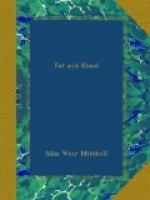The intelligent and watchful physician must, of course, know how far to enforce and when to relax these rules. When it is needful, as it sometimes is, to prolong the state of rest to two or three months, the patient may need at the close occupation of some kind, and especially such as, while it does not tax the eyes, gives the hands something to do, the patient being, we suppose, by this time able to sit up in bed during a part of the day.
The moral uses of enforced rest are readily estimated. From a restless life of irregular hours, and probably endless drugging, from hurtful sympathy and over-zealous care, the patient passes to an atmosphere of quiet, to order and control, to the system and care of a thorough nurse, to an absence of drugs, and to simple diet. The result is always at first, whatever it may be afterwards, a sense of relief, and a remarkable and often a quite abrupt disappearance of many of the nervous symptoms with which we are all of us only too sadly familiar.
All the moral uses of rest and isolation and change of habits are not obtained by merely insisting on the physical conditions needed to effect these ends. If the physician has the force of character required to secure the confidence and respect of his patients, he has also much more in his power, and should have the tact to seize the proper occasions to direct the thoughts of his patients to the lapse from duties to others, and to the selfishness which a life of invalidism is apt to bring about. Such moral medication belongs to the higher sphere of the doctor’s duties, and, if he means to cure his patient permanently, he cannot afford to neglect them. Above all, let him be careful that the masseuse and the nurse do not talk of the patient’s ills, and let him by degrees teach the sick person how very essential it is to speak of her aches and pains to no one but himself.
I have often asked myself why rest is of value in the cases of which I am now speaking, and I have already alluded briefly to some of the modes in which it is of use.
Let us take first the simpler cases. We meet now and then with feeble people who are dyspeptic, and who find that exercise after a meal, or indeed much exercise on any day, is sure to cause loss of power or lessened power to digest food. The same thing is seen in an extreme degree in the well-known experiment of causing a dog to run violently after eating, in which case digestion is entirely suspended. Whether these results be due to the calling off of blood from the gastric organs to the muscles, or whether the nervous system is, for some reason, unable to evolve at the same time the force needed for a double purpose, is not quite clear, but the fact is undoubted, and finds added illustrations in many of the class of exhausted women. It is plain that this trouble exists in some of them. It is likely that it is present in a larger number. The use of rest in these people admits of no question. If we are




